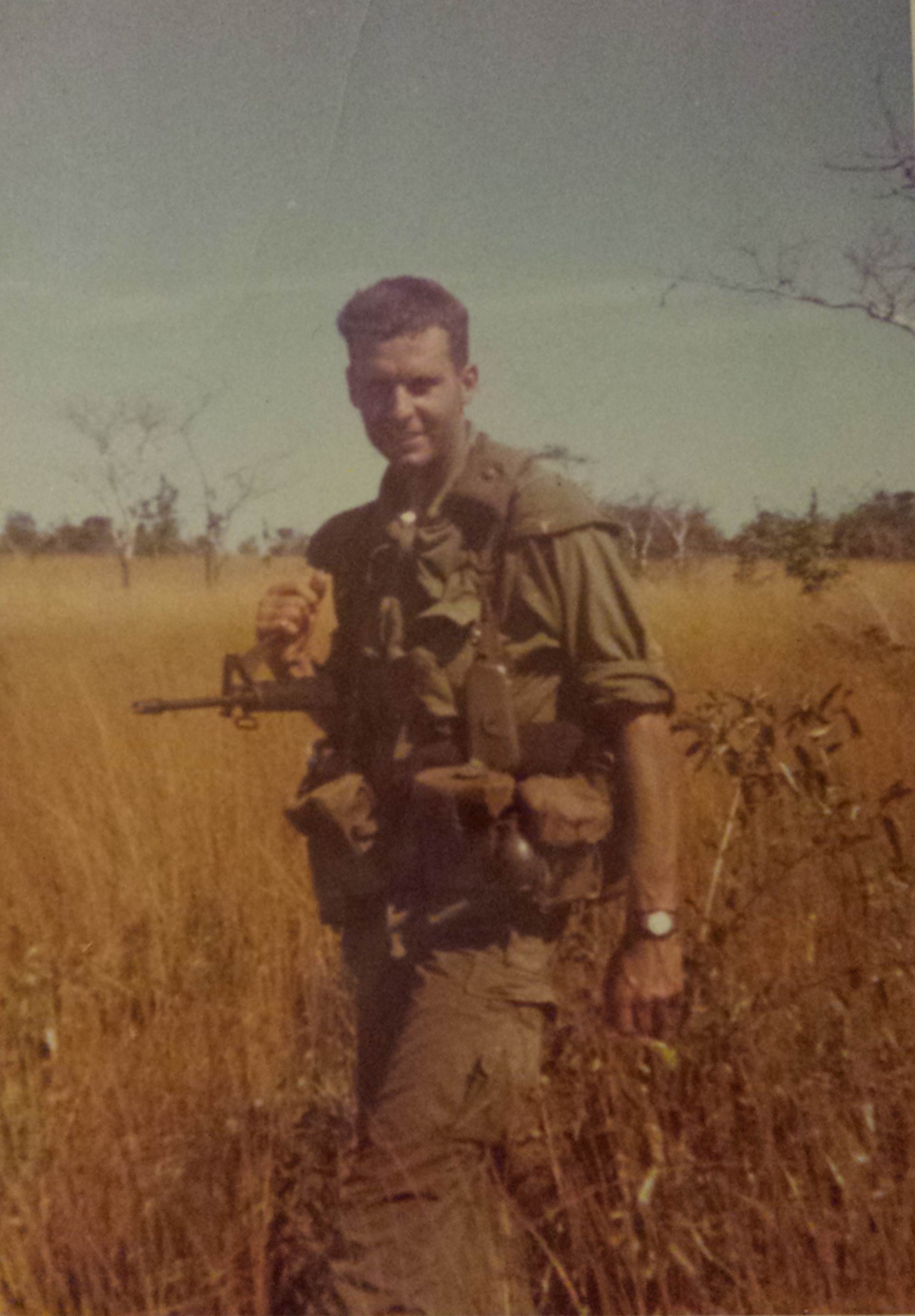TRANSCRIPTION
What was life like before you joined the military?
I was a college student going to graduate school. I had a pretty easy life. I lived in Seattle, had an apartment, wasn't married.
What made you want to join the army?
I think I wanted to join because a couple of reason. My family had been military. My father actually fought in the first war. He was much older when I was born, but he was in the infantry in the western front 1918. And my stepdad and his family all joined in World War II, they were pilots, he was a pilot. And so I just ya know had seen the military as something honorable to do. And I'd kinda run out of money for going to school and run out of intelligence. I was kinda at the end of the street. I didn't wanna become a PhD candidate, that was too difficult. I didn't wanna study anymore. Didn't wanna read anymore novels. (laughs)
How did you feel about the draft?
I think the draft worked better than a lot of people think it did. I had a lot of draftees and volunteers in my platoon, you couldn't tell the difference. They fought just as hard as anybody else. Matter of fact, they weren't going to college, they were country kids sometimes, and once they got together in the same platoon you couldn't tell the difference anyway. They all depended on each other. And I think the draft issue didn't come up in Vietnam, it came up out here on the college campuses when the army threatened to, when the government threatened to take away draft deferments. If you're going to college, taking so many hours, you couldn't be drafted. Well a lot these guys were stretching out their college to six and seven years just so they wouldn't have to go into the military and they were taking like two courses and trying to make a career out of being a college student and the government cracked down on it. Said you had to have a full load.
What did you know about Vietnam and the war before enlisting?
Before enlisting? The war had just begun and we were, we were into the first phases of it and it was still kinda an unknown as to what was happening. We'd had I think one big battle and um, so it was kinda, the American people were still kinda enthusiastic about it. You know we wanted to help South Vietnam. The political issues were pretty complicated. I don't think a lot of people understood. We just saw it as "Let's go over and help the South Vietnam against the communist and they were trying to take over the country.
What was basic training like?
Pretty rough. You know it always is. It was in Fort Gordon, Georgia. Lot of push-ups. Lived in old, wooden "Beetle Bailey" barracks. What we called Beetle Bailey type barracks. And uh, it was cold, it was winter time. It was either real cold or real hot. And uh, let's see, it took, it was a nine week course. So basic training is nine weeks and then you went for advanced, what they call advanced individual training. And then I went to OCS for six months after that. So I was in, I was really in intensive training for almost 10 months of the year. Almost the entire year before I got my commission. So probably I'd rank it as an estimated 10,000 push-ups at least. You know running all the time. It's very physical, but I was in pretty good shape when I was younger. I'd been in you know, I played sports in high school, played sports in college, so I knew the routine and how to get along.

How old were you when you arrived in Vietnam?
I think I got over there after my training, and I think I was about 26 years old. I was a little bit older than the average trooper you might say.
When you arrived in Vietnam, where were you stationed?
I went straight to the first camp division, which was at, the base camp was a place called An Khe, which was up in the central highlands. And then we moved the battalion I was in moved down towards the coast to a city called Phan Thiet.
What battalion were you assigned to?
I was assigned to battalion, it was the 2nd of the 7th, which has a long distinguished history. It goes clear back. The seventh cavalry was the outfit that uh Custard had got wiped out at Little Bighorn, and so we still had the same, you might call it unit history. Although, the organization and everything had changed since then. We were a cavalry, and cavalry is usually mounted troops on horseback at one time, and we were mounted on helicopters. So we made a lot of helicopter raids. Got to fly in a lot of choppers.
What were living condition like?
On the ground. Flat on the ground with an air mattress or not and you just got used to seeing the same clothes for eight months and uh wearing the same pair of boots until they wore out and then you got a new set. Wanted a bath, just jump in the creek. Well we went back to base camp occasionally, you know and got cleaned up in showers and things like that, but we'd be out 5 or 6 days in the patrols and you didn't get a chance to brush your teeth very much.
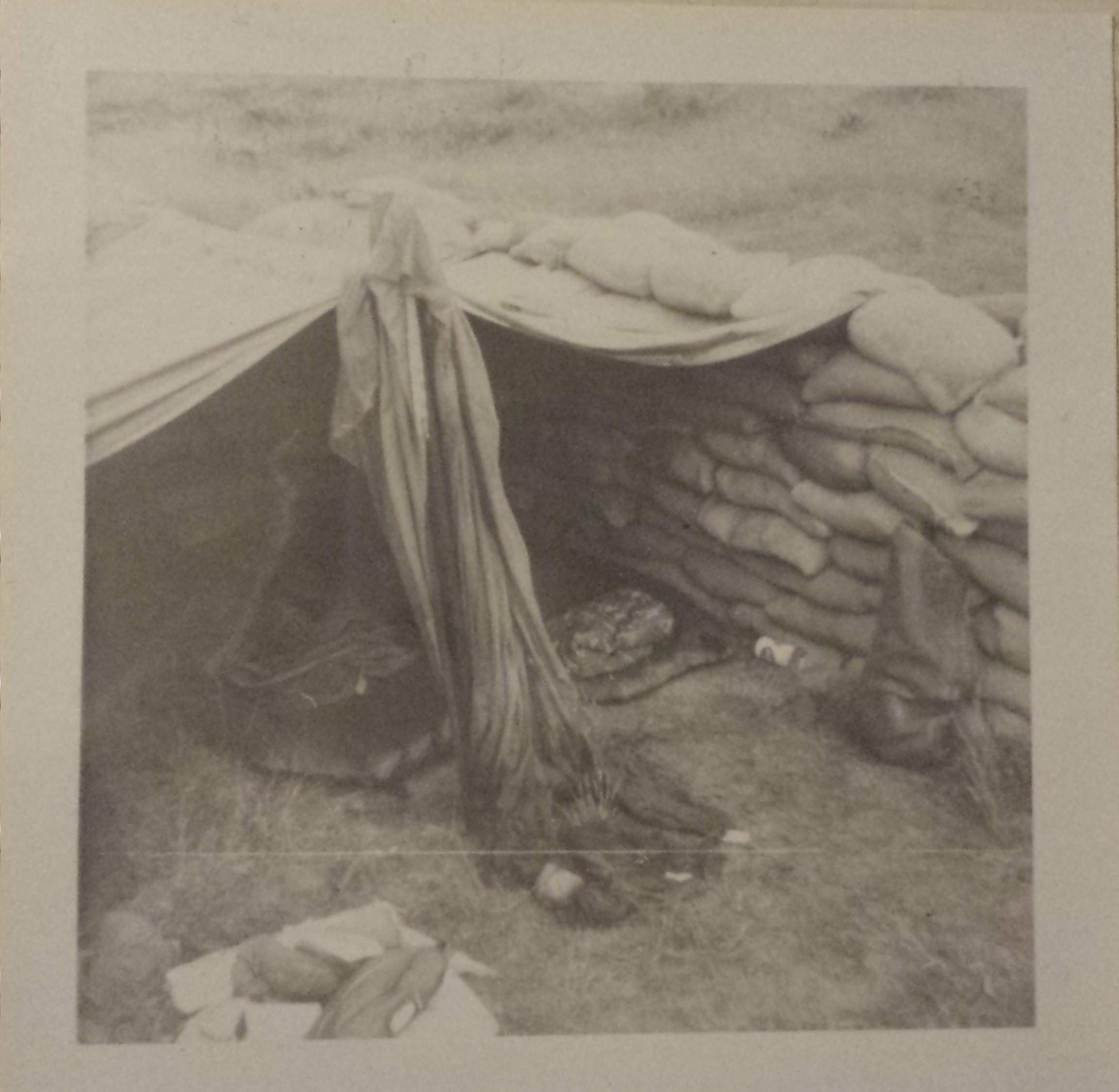
What was your specific job?
I was an infantry platoon leader, had approximately 30, was supposed to have about 44 men in the platoon, but never was full strength, had about 25 to 30 people in it.
What was a typical day like in Vietnam?
A typical day ran 24 hours cause you were always worried about what was happening at night. You got a little bit of sleep, had to get up at night and check things out and we usually moved. They might pick us up by helicopter and take us to another landing zone and we'd move 4 or 5 miles through the jungle, maybe picked up again and taken some place else. And sometimes you made contact with enemy, have a little fire fight. Shoot out, ya know.
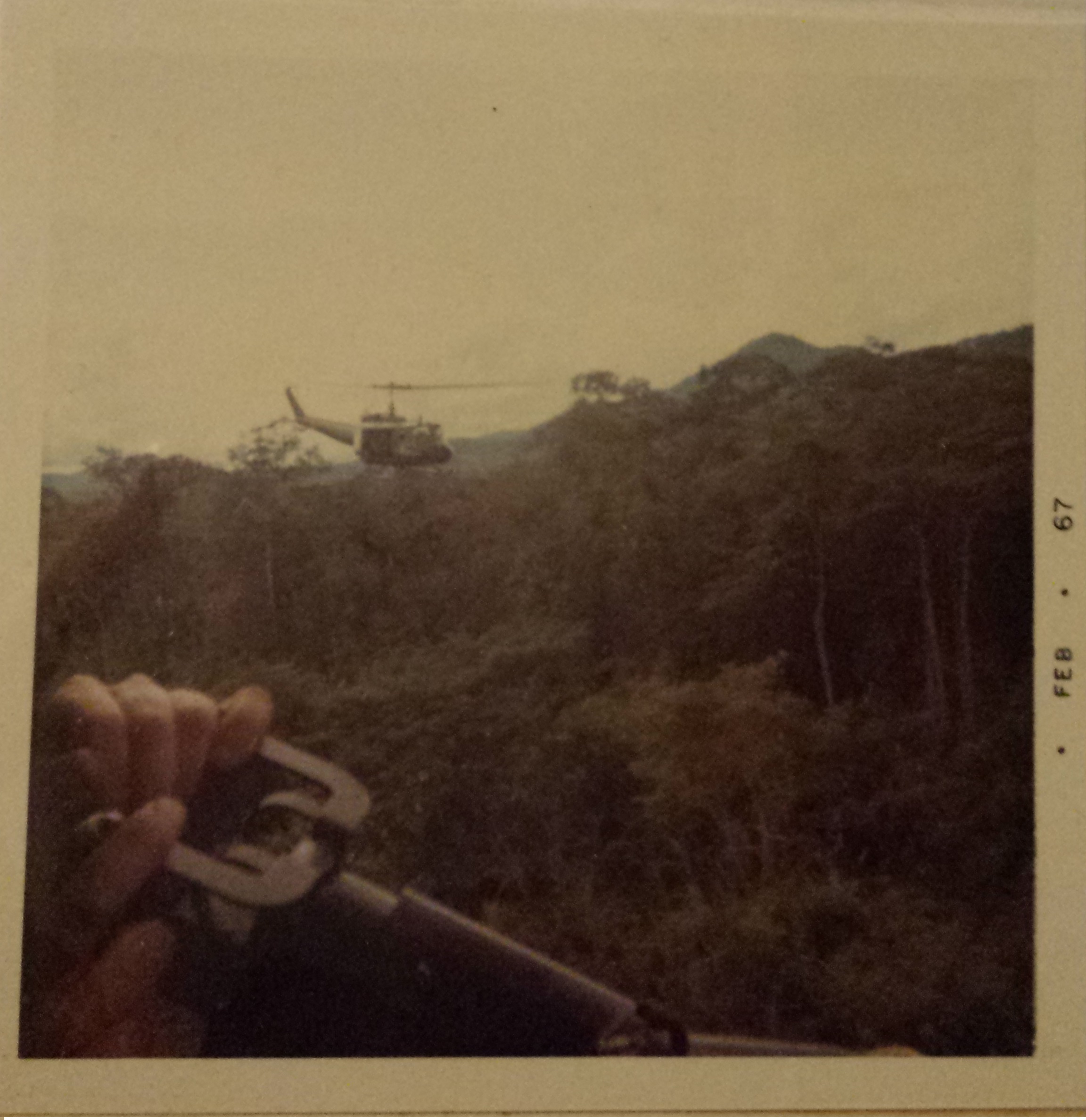
What was it like going through the jungle?
Oh the jungle was beautiful. It was really beautiful. Big, long vines, colorful snakes (laughs) heat! Uh, the foliage was just, streams, rocky streams, and it's an ecological paradise. All kinds of birds, but the snakes are the things that are interesting. They got some snakes over there that you don't wanna tango with. Constrictors, and cobras, they don't have just a normal North American Rattle Snake, they got some monsters over there, And they got lions running around, lots of monkeys. We were patrolling one time, this is kind of a funny story, and we came across, we were on this trail, and we came across this huge, there were several volleyball, basketball sized, round kinda like mud with lots of um straw in them, lots of fiber, and we couldn't figure out what they were, and they were big there were about, they were like that kind of along the trail, elephant turds (laughs) elephant droppings! Yeah. So we you know "where's the elephant around" and they use elephants and water buffalo over there for as um farm animals to plow fields. I don't think there were any wild elephants, but there were wild cats. (talks about other animals out in the jungle) But there was a lot of beautiful times, times you kinda look back a there was this lush valley and realize you were gonna down into that. Just beautiful. Flowers, lots of flowers in various places. It wasn't war torn, you think about a war zone being all beat up and blasted, but it wasn't that way at all. Maybe some places.
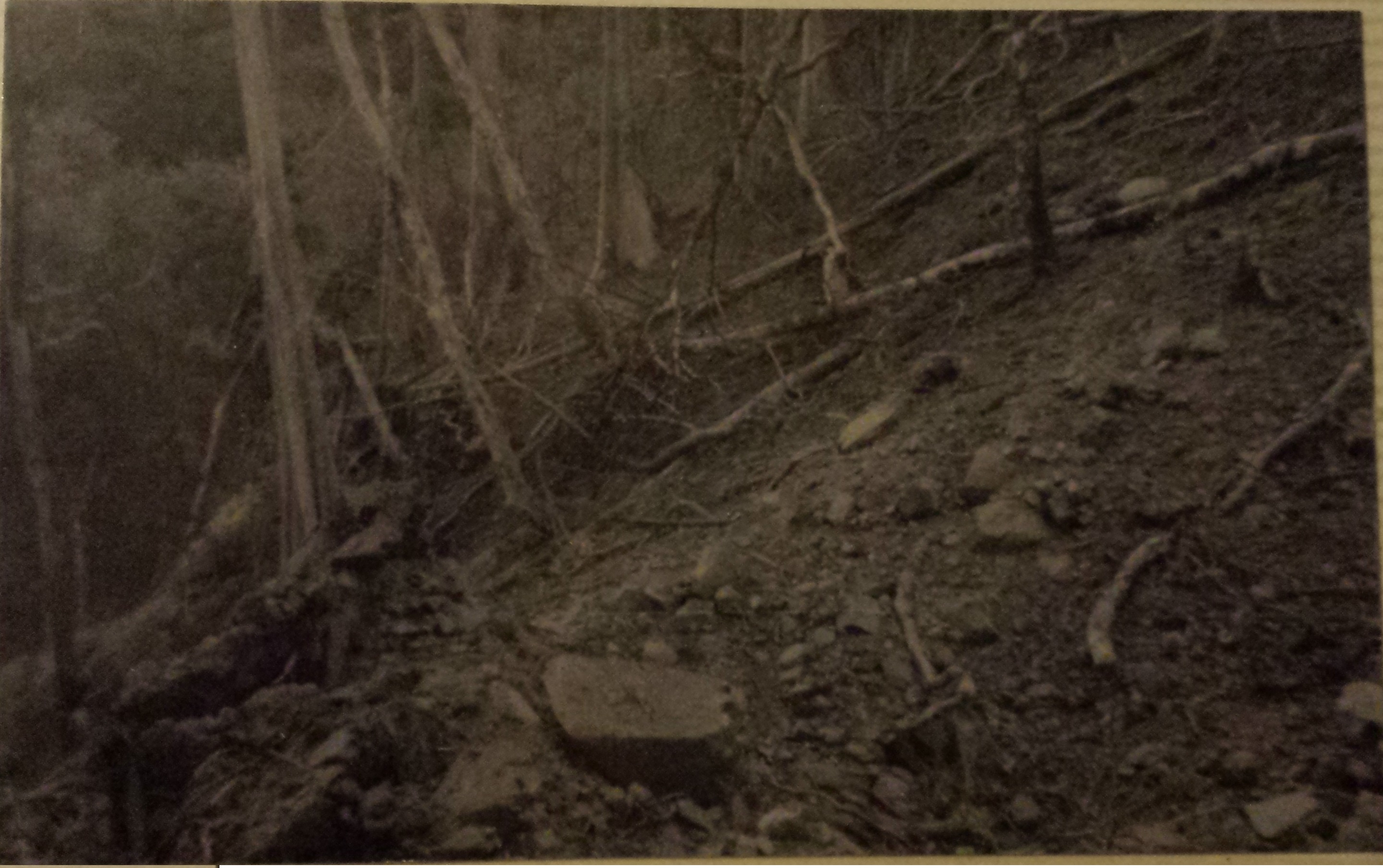
Did you guys ever have free time?
Oh yeah, when we went back to An Khe or Phan Thiet, to the base camp area. We had days off, we'd write letters, read books. You had ya know, in the field you carried most of what you had on your back that you needed for the patrol. Back at the base camp you had what we called a "B Bag" which was a bag with all of your other stuff, change of underwear, books, shaving gear, things like that. Personal items that you didn't take with ya on the patrol.

Are there any particular relationships you remember making?
Oh you get real tight, real good relationship with the platoon, the people that you're with. The sergeants that work with ya and the other platoon leaders. I've lost contact with everybody, but you see them on a daily basis and they depend on you. They depend on you to make the right decision, make the wrong decision get a bunch of people killed, and I depended on them to carry out the orders I give them too.
Were you involved in any of the major battles?
Actually, no. We didn't have that many major battles. Except for Tet and some battles early on. The was kind of a squaddle of a war, it was what we call a low intensity conflict, it wasn't like World War II where you had big battles like the Bulge, Market Garden, Stalingrad, things like that where armies met and slugged it out. They um, a lot of it was with the guerillas who was hit and run, they come in and take over a village and have a little firefight to root em out, or maybe just patrol the jungle until you made contact with them. The one big battle occurred before we got over there was in I think about November of '65, was called the Ia Drang, Ia Drang Valley and the battalion I was in was actually in that battle, but I wasn't there at the time. They actually made a movies about this called We Were Soldiers Once. That was a main battle and then the Tet Offensive in '68. Now there were some other campaigns, there was a big battle up in the northern part of Vietnam, way up in the DMZ where mostly the marines got involved and they tried to root them out of their base camp up on the DMZ and the marines got pounded up there for about a month before the Vietnamese gave up on them, they couldn't root em out. But these two, this was the first one. The battle here, the idea behind the Vietnamese was they were gonna show us they could fight better than we could. That we had just a bunch of sloppy, mall rat, hamburger eating kids we recruited and that they'd cut and run at the first fire, but that didn't happen. I mean they were tough guys, they were tough, but we did sorta over power them because we always had more firepower than they did. We could always bring in artillery, air strikes, we even had naval gun fire from destroyers and ships off the coast firing heavy guns. They didn't have any of that. They were armed with light machine guns, some heavy machine guns, they didn't have any artillery. We had lots of it, lots of stuff so we could always out shoot em, and that's how we got through most of our battles.
Did you receive any medals?
Yea, I got two purple hearts. One for being shot once and the other for a little land mine action, cut me up a little. I got a bronze star, which is the lowest level, what they call a valor/ bravery award, got an air medal for flying helicopters, and then some service medals. And then I got a lot of medals afterwards. They were kinda like campaign medals, kinda like "I was there" stuff that every soldier got, good conduct medals, stuff like that. I didn't get a medal of honor or anything like that. That's top level stuff, gotta be dead to get that one. (laughs) Half of em are, that's the way it is.

Do you have any regrets joining the service?
No! None what-so-ever. I stayed in. It was a great career, stayed in 29 years after Vietnam. I mean included with Vietnam, and all my training.
What made you want to stay in the military after your tours?
I just thought it was a real good career. I just like the whole idea of you know wearing a uniform for one thing and having an honorable place in society, being an officer, being in charge of things, operations, plans. I met some outstanding people in the military, guys who, Colin Powell for instance, you know who he is? He ran for president a couple of years ago. I got a chance to brief him when I was in Europe stationed in the NATO headquarters. Great guy. And then I been around a bunch of jerks sometimes. Terrible guys that would get you killed. But they're really military heroes, guys that went on to be generals, or they got out of the military went into politics. (Talks about William Westmoreland)

Did going to Vietnam change your attitude or views on life?
Yeah, it had to. I mean I grew up. There's no way it can't. War has a uh, it's a traumatizing event. And you can't come out of that without it having some kind of impact on you, on your values and everything. My values were shaped by the military and I stayed in the military so I kept uh, you know honor, and loyalty, and truthfulness, physical conditioning, things like that. They all became, you assimilated them as your values. Just like you would for any other profession.
Do you wish you had done anything different while there?
Oh yeah, of course. God, ya know the patrols that we went the wrong direction or got lost. Ya know decisions that I made that got us into trouble, or got us in the swamp. I didn't get anybody killed. That was one thing I was proud of. Ya know (laughs) I thought. I did have a sergeant that was shot. I was the second person in the platoon that was shot and got air-vacted, picked up by a helicopter and taken back to the hospital. But I was kinda proud of that, for eight months I didn't get anybody killed.
While you were there did you have any doubts?
Not the first tour. Not the first time cause we were still kinda winning the war. I had some doubt about the way in which we were doing things, but I wasn't in doubt about us being there. The second time I went back I was in headquarters and I didn't really get out in the field doing much fighting, I wasn't asleep on the ground. I lived in a headquarters cantonment area and that's when I started having doubts about the whole thing. I could see that we were not, we just weren't winning it, we weren't winning the hearts and minds like we claimed we had and we kept changing our strategies and um, Lyndon Johnson was the president and he was wavering back and forth. And then we hear all these stories about things were happening in the states GIs coming back and they were being spit at when they'd gotten off the airplane. A lot of those stories weren't true, I don't think, maybe some incident or two had occurred. At that point we realized it was a lost cause and I started thinking about the military career that I was in. Got assigned to various headquarters, went overseas to Germany twice, two tours, got married.
So you got married after all your military service?
No I got married after the second tour in Vietnam. Yeah, got married in 1971, and we were a military family until 1993, when I retired. My daughter was born at Fort Sill, Oklahoma on a military reservation, educated in what they call DOD schools, Department of the Defense schools, overseas. Graduated from high school in Germany, not from a German high school, from an American military high school.
What do you think was your best memory about your experience
Oh I think the first experience, the best experience was the first time I got into, we got into a firefight and exchanged fire with the enemy. You realized you know that with heavy incoming fire and you realized that you probably, you were gonna make it. You weren't gonna cut and run. And you know some guys can handle that and some get a little bit nervous and ya know don't make it.
What was life like once you got home?
When I got home I spent a lot of time in the hospital with corrective surgeries. So I went to my home town, which was Tacoma, WA. They had this big military base there Fort Lewis, Washington. And there was a big military hospital. So I was in and out of the hospital for, I had five operations. So I had a long recovery period. Lot of physical therapy, and I wasn't laying on my back the whole time. I mean I go in for an operation, I guess I had three operations, I had one when I got right out of the field Uh M.A.S.H hospital, you seen the show M.A.S.H on TV, went to one of those hospitals and they fixed me up. Then, I went to Japan for 30 days, to a base there, had another operation. And then when I got back to the state they tried to do some work to try to free up my wrist so it would uh, so it could be functional. And it wasn't ever very successful. Got locked wrist, can't you know, gunshot wounds are very tough. They hurt ya (laughs)
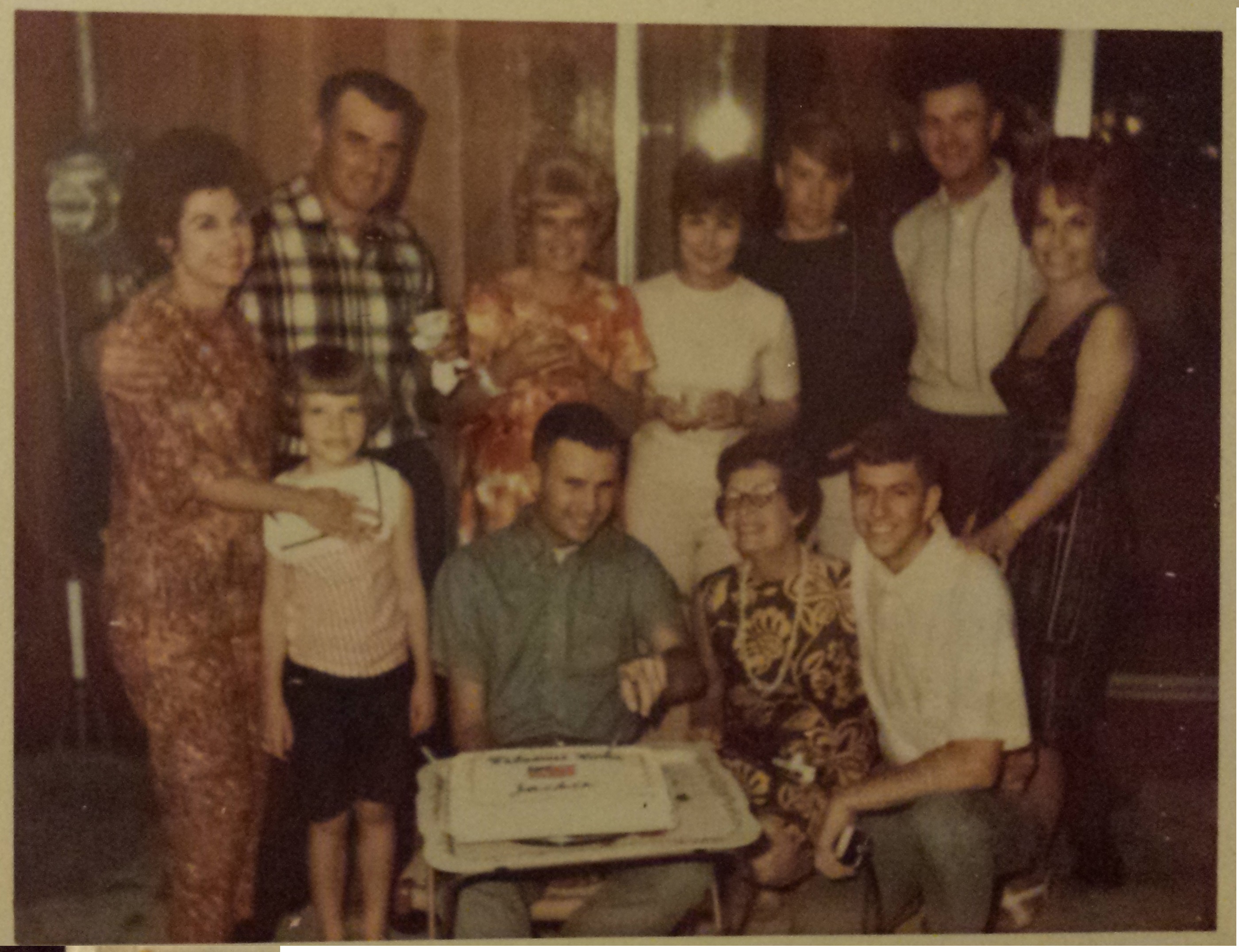
Do you feel the war was necessary?
Looking back at it now I think it was a, it was kind of a glorious, some kind of a glorious crusade to save a small little country from what we thought were the communists. But I think we lost a lot of, we had a lot of problems back here in the United States justifying, we didn't carry out the war correctly. We managed to get ourselves in to base camp areas and we didn't really get out and meet the people. We had these big headquarters that we put up and see I went back for a second tour. My first tour I was over there before what we call a Tet Offensive, which was in January 1968. That was the turning point in the war. The North Vietnamese and the South Vietnam guerillas came out and attacked about 10 citied all at one time, 10 or 12 cities. And they really made us think that, we thought we had the war under control, and we didn't. They sacrificed a lot of people. They may have gotten 60,000 troops killed just in that week, but we had no way that we, we didn't anticipate it happening. So it was a terrible intelligence failure, and from that point the war kinda went downhill. Protest movements in the country, there was all sorts of problems here, we were right in the midst of civil rights, ya know the latter stages of civil rights in '68. Uh, Martin Luther King was assassinated, the riots on campuses. Cities were being torn up, race riots, George Wallace was shot. The president himself, Lyndon Johnson decided not to run for another term, and so we were on the way out when I went back for my second tour over there in 1970 we were on the way out. We were packing it out and we were uh turning it over to the South Vietnamese, kinda like we did in Iraq in a way. And it wasn't working out very well. They weren't determined to fight very strongly, there were problems with loyalty, they weren't very military efficient, and they were up against some real tough guys from the north, they had good generals and determined political leaders, and about a year after we left, let's see I think it was about 1972, we were totally out of the country. In 1975, they invaded the country. The North Vietnamese conquered the whole country so the whole thing was a lost cause. That kinda left you with a little bit of "What was this all about" kinda feeling. I'm sure the troops go in Iraq having the same um, probably having the same experience.
Is there anything else you would like to add to this interview?
No, except I appreciate you interviewing me. And um, you know, keeping the idea of what I do think is important, we do need to remember our wars, and we need to remember our veterans, and take care of them. Right now we have a terrible situation in the VA we got guys waiting to get treated and things like that and we need not to forget. We need to remember the sacrifice the country makes. War is considered, fighting a war is considered one of the, well the decision to go to war is considered one of the most important decisions that a country can make. They can institute all sorts of social protocol, but when you decide you're gonna send troops into a country, a foreign country, you know automatically there are gonna be a lot of people killed, and that's what, that's where the decision makers really earn their money. And right now, I don't think the Congress is up to that, I don't think the Congress could, would pass war. That's why we got these kind of low level conflicts we're engaging in and we're trying to complete them on the cheap and that's why I think getting rid of the draft was a mistake also. We draft a lot of young people, and we have to draft women too because of women's rights, you kinda fix the country's attention on what it means to be in the military, what it means to make that kinda sacrifice. Then, Congress has to really think hard about sending over people that they have just been drafted. It's one thing in their minds trying to think "well these guys are all volunteers, they understand what the risks are," but then if we have draftees in the military, half of them are just taken off the streets and put in the military. Then we're gonna get you know, it becomes a little more difficult, and the same thing with women, we put women in the service, it's gonna be difficult to make that sacrifice also.
